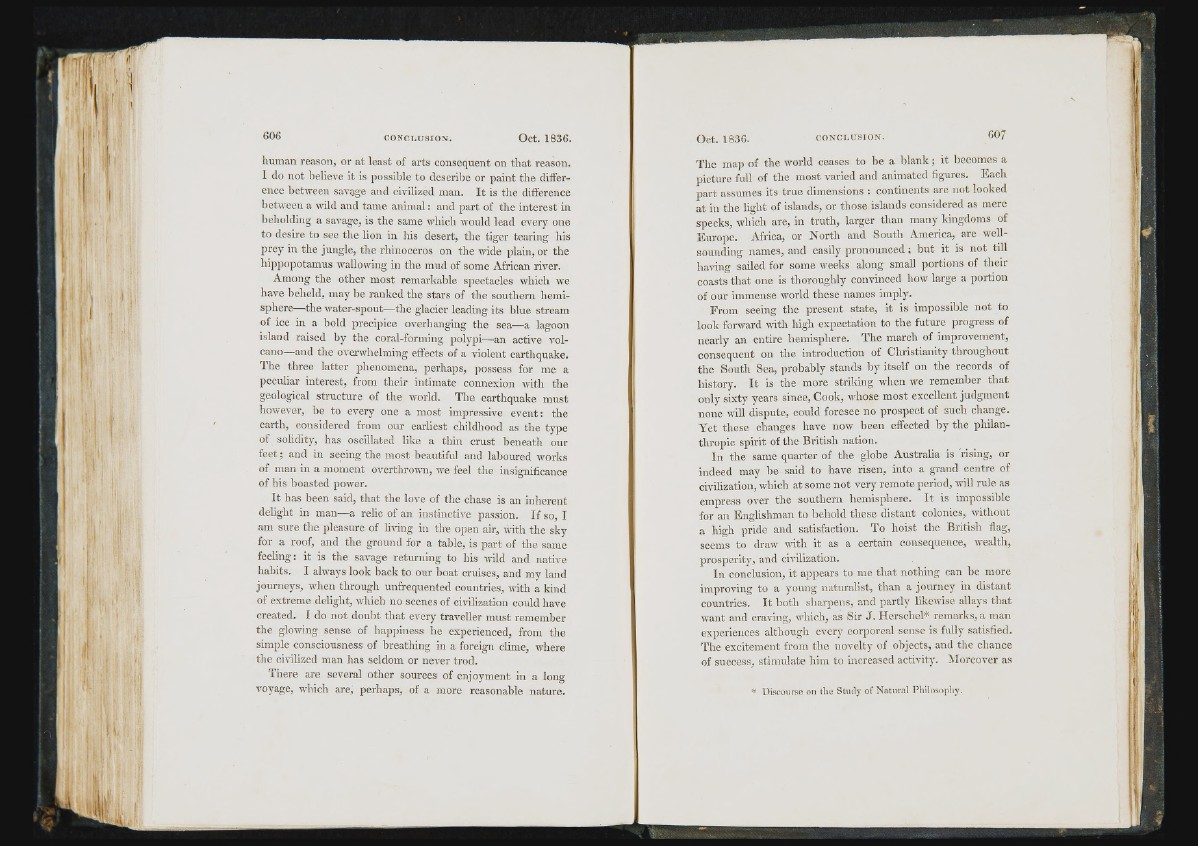
I I
human reason, or at least of arts consequent on that reason.
I do not believe it is possible to descrilie or paint the difference
between savage and civilized man. It is the difference
between a wild and tame animal; and part of the interest in
beholding a savage, is the same which would lead every one
to desire to see the lion in his desert, the tiger tearing his
prey in the jungle, the rhinoceros on the wide plain, or the
hippopotamus wallowing in the mud of some African river.
Among the other most remarkable spectacles which we
have beheld, may be ranked the stars of the southern hemisphere—
the water-spout—the glacier leading its blue stream
of ice in a bold precipice overhanging the sea—a lagoon
island raised by the coral-forming polypi—an active volcano—
and the overwhelming effects of a violent earthquake.
The three latter phenomena, perhaps, possess for me a
peculiar interest, from their intimate connexion with the
geological structure of the world. The earthquake must
however, be to every one a most impressive event: the
earth, considered from our earliest childhood as the type
of solidity, has oscillated like a thin crust beneath our
fe e t; and in seeing the most beautiful and laboured works
of man in a moment overthrown, we feel the insignificance
of his boasted power.
It has been said, that the love of the chase is an inherent
delight in man—a relic of an instinctive passion. If so, I
am sure the pleasure of living in the open air, with the sky
for a roof, and the ground for a table, is part of the same
feeling: it is the savage returning to his wild and native
habits. I always look back to our boat cruises, and my land
journeys, when through unfrequented countries, with a kind
of extreme delight, which no scenes of civilization could have
created. I do not doubt that every traveller must remember
the glowing sense of happiness he experienced, from the
simple consciousness of breathing in a foreign clime, where
the civilized man has seldom or never trod.
There are several other sources of enjoyment in a long
voyage, which are, perhaps, of a more reasonable nature.
The map of the world ceases to be a blank; it liecomes a
picture full of the most varied and animated figures. Each
part assumes its true dimensions : continents are not looked
at in the light of islands, or those islands considered as mere
specks, which are, in truth, larger than many kingdoms of
Europe. Africa, or North and South America, are well-
sounding names, and easily pronounced; but it is not till
having sailed for some weeks along small portions of their
coasts that one is thoroughly convinced how large a portion
of our immense world these names imply.
From seeing the present state, it is impossible not to
look forward with high expectation to the future progress of
nearly an entire hemisphere. The march of improvement,
consequent on the introduction of Christianity throughout
the South Sea, probably stands by itself on the records of
history. It is the more striking when we remember that
only sixty years since, Cook, whose most excellent judgment
none will dispute, could foresee no prospect of such change.
Yet these changes have now been effected by the philanthropic
spirit of the British nation.
In the same quarter of the globe Australia is rising, or
indeed may be said to have risen, into a grand centre of
civilization, which at some not very remote period, wiU rule as
empress over the southern hemisphere. It is impossible
for an Englishman to behold these distant colonies, without
a high pride and satisfaction. To hoist the British flag,
seems to draw with it as a certain consequence, wealth,
prosperity, and civilization.
In conclusion, it appears to me that nothing can be more
improving to a young naturalist, than a journey in distant
countries. It both sharpens, and partly likewise allays that
want and craving, which, as Sir J. Herschel* remarks, a man
experiences although every corporeal sense is fully satisfied.
The excitement from the novelty of objects, and the chance
of success, stimulate him to increased activity. Moreover as
* D isc o u rse o n tb e S tu d y o f N a tu r a l P h ilo so p h y .